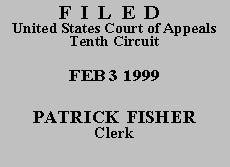

| FLOYD BLACKBURN,
Petitioner-Appellant, v. JOE R. WILLIAMS, Warden CNMCF; ATTORNEY GENERAL FOR THE STATE OF NEW MEXICO, Respondents-Appellees. |
|
Petitioner Floyd Blackburn requests a certificate of appealability to appeal the district court's decision denying his petition for a writ of habeas corpus under 28 U.S.C. § 2254.(1) To be entitled to a certificate of appealability, petitioner must make "a substantial showing of the denial of a constitutional right." 28 U.S.C. § 2253(c)(2). We conclude that he has failed to make the required showing and therefore, deny the request and dismiss the appeal.
Petitioner was charged in New Mexico state court with two counts of trafficking a controlled substance, with the first count occurring on October 4, 1994, and the second on October 13, 1994. As part of a plea agreement, he pled guilty in 1995 to count one in exchange for count two being dismissed. With an enhancement for being a habitual offender, he was sentenced to seventeen years in prison, four of which were suspended, followed by two years of parole. He did not file a direct appeal, but did file a state habeas petition in 1995, which was denied.
Petitioner filed the present habeas petition in the district court on May 29, 1996, contending that his conviction should be vacated because his counsel was ineffective in two ways. He claims that he was in jail on the day the drug sale charged in the second count occurred and that the undercover officer who allegedly purchased the drugs from him misidentified him as the seller. He contends that his counsel failed to investigate this defense to the second count, and that had he realized he had a complete defense to this count, he would not have pled guilty to the first count. He also contends that his counsel was ineffective for failing to challenge an unconstitutionally suggestive pretrial photo identification by the undercover officer. Adopting the findings and recommendation of the magistrate judge, the district court held that petitioner had not shown that his counsel was ineffective and denied the petition without a hearing. The court also denied petitioner's request for a certificate of appealability.
To establish ineffective assistance of counsel, petitioner must show that his counsel's performance was so deficient that counsel was not performing to the level guaranteed by the Sixth Amendment, and that counsel's deficient performance prejudiced him. See Strickland v. Washington, 466 U.S. 668, 687 (1984). Because he pled guilty, petitioner's ultimate burden on the prejudice prong is to show that there is a reasonable probability that had his counsel's performance not been deficient, he would not have pled guilty. See Hill v. Lockhart, 474 U.S. 52, 59 (1985).
Petitioner submitted an affidavit stating that he was in jail on a parole violation on the date of the second count. He claims that because he never saw a copy of the criminal information charging him, he did not know he had a defense to the second count, and his counsel was ineffective for failing to investigate and discover the exculpatory evidence that would support that defense. The district court found that the record showed petitioner was not arrested on the parole violation until several weeks after the drug sale charged in the second count. It also noted that the criminal information was read to petitioner at his arraignment, that the undercover officer testified at the preliminary hearing as to when the second count occurred, and that petitioner stated at the plea hearing that he understood the charges against him. Relying on Worthen v. Meachum, 842 F.2d 1179, 1184 (10th Cir. 1988), the district court concluded that petitioner's claim was "wholly incredible" and did not warrant an evidentiary hearing. See Lasiter v. Thomas, 89 F.3d 699, 703 (10th Cir. 1996).
In the other part of his ineffective counsel claim, petitioner contends that his counsel was ineffective for failing to move to suppress the undercover officer's out-of-court identification of him as unconstitutionally suggestive. See Neil v. Biggers, 409 U.S. 188, 199-200 (1972). The officer had identified him from a photograph after the second transaction, and also later identified him at the preliminary hearing. The court held that even had the one-photo identification been unduly suggestive, it was constitutionally permissible because the officer had ample opportunity to view petitioner during the sales, was attentive, had previously described petitioner accurately, and was certain of the identification, and because the identification occurred only four days after the second transaction. See id. The court concluded that counsel was not ineffective for failing to challenge this identification.
On appeal, petitioner reargues his claims of ineffective counsel. We have fully considered his arguments and reviewed the record, and conclude, for substantially the same reasons as stated in the magistrate judge's report, that his arguments are without merit and that he has failed to make a substantial showing of the denial of a constitutional right. The application for a certificate of appealability is therefore DENIED, and the appeal is DISMISSED.
Entered for the Court
Circuit Judge
*. This order and judgment is not binding precedent, except under the doctrines of law of the case, res judicata, and collateral estoppel. The court generally disfavors the citation of orders and judgments; nevertheless, an order and judgment may be cited under the terms and conditions of 10th Cir. R. 36.3.
1. We construe petitioner's opening brief as a request for a certificate of appealability, which must be granted before we may address the merits of his appeal. See 28 U.S.C. § 2253(c).